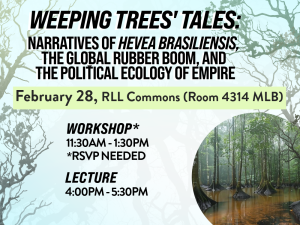Presented By: Romance Languages & Literatures RLL
Workshop: Weeping Trees' Tales: Narratives of Hevea Brasiliensis, the Global Rubber Boom, and the Political Ecology of Empire
Workshop with Olimpia Rosenthal

This is a workshop associated with a talk that takes place later the same day, from 4:00pm - 5:30pm.
This talk traces how rubber-producing plants became a global commodity, and it emphasizes the disastrous environmental impact and brutal labor exploitation that ensued as a result. I analyze visual and textual narratives of the rubber-producing tree hevea brasiliensis, and I propose a speculative mode of analysis based on shifting scientific paradigms on plant intelligence and plant behavior. I also discuss the role of key figures like William Jackson Hooker—the English botanist and director of the Royal Botanical Gardens at Kew who successfully domesticated hevea seedlings, paving the way for the development of rubber plantations in British colonies in Southeast Asia and, in the process, contributing to the collapse of the Amazonian rubber boom—and Roger Casement—the Irish diplomat known for his harrowing accounts of the violent labor regimes in the Congo Free State and the Peruvian Amazon propelled by the rubber economy. The talk further shows the links between botany, plant commodification, and imperialism.
Olimpia E. Rosenthal is Associate Professor of Spanish and Portuguese at Indiana University. She is a scholar of colonialism in Latin America, specializing in literary and cultural production that reflects material practices of domination, the long-term effects of colonization, and the ways in which imperial power has been challenged and contested. Her first book, Race, Sex and Segregation in Colonial Latin America (Routledge 2022), examines the emergence and early development of indigenous segregationist policies in Spanish and Portuguese America. The book shows that segregationist measures influenced the material reorganization of space, shaped colonial processes of racialization, and contributed to the politicization of reproductive sex. She has also organized a series of international conferences, including one on Subaltern Studies at Indiana University’s Gateway Center in India, and she recently co-organized the Sawyer Seminar Global Slaveries, Fugitivity, and the Afterlives of Unfreedom. Her current book project examines the political ecology of the Amazonian rubber boom.
This talk traces how rubber-producing plants became a global commodity, and it emphasizes the disastrous environmental impact and brutal labor exploitation that ensued as a result. I analyze visual and textual narratives of the rubber-producing tree hevea brasiliensis, and I propose a speculative mode of analysis based on shifting scientific paradigms on plant intelligence and plant behavior. I also discuss the role of key figures like William Jackson Hooker—the English botanist and director of the Royal Botanical Gardens at Kew who successfully domesticated hevea seedlings, paving the way for the development of rubber plantations in British colonies in Southeast Asia and, in the process, contributing to the collapse of the Amazonian rubber boom—and Roger Casement—the Irish diplomat known for his harrowing accounts of the violent labor regimes in the Congo Free State and the Peruvian Amazon propelled by the rubber economy. The talk further shows the links between botany, plant commodification, and imperialism.
Olimpia E. Rosenthal is Associate Professor of Spanish and Portuguese at Indiana University. She is a scholar of colonialism in Latin America, specializing in literary and cultural production that reflects material practices of domination, the long-term effects of colonization, and the ways in which imperial power has been challenged and contested. Her first book, Race, Sex and Segregation in Colonial Latin America (Routledge 2022), examines the emergence and early development of indigenous segregationist policies in Spanish and Portuguese America. The book shows that segregationist measures influenced the material reorganization of space, shaped colonial processes of racialization, and contributed to the politicization of reproductive sex. She has also organized a series of international conferences, including one on Subaltern Studies at Indiana University’s Gateway Center in India, and she recently co-organized the Sawyer Seminar Global Slaveries, Fugitivity, and the Afterlives of Unfreedom. Her current book project examines the political ecology of the Amazonian rubber boom.